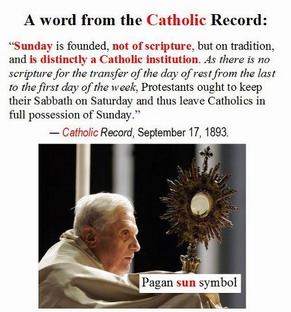Have you ever stopped to think about why we celebrate Sunday as the Sabbath, when the Bible clearly states that the day of rest is the seventh day, Saturday?

Image: www.sabbathseventhday.org
The question of the Sabbath and its shift from Saturday to Sunday has been a source of debate for centuries. For many Christians, particularly those within the Catholic Church, understanding the history of this change is crucial. This article will delve into the complex history of the Sabbath observance, examining the role of the Catholic Church in its evolution and exploring the enduring controversy surrounding this shift.
The Early Church and the Sabbath
The early Church, largely comprised of Jewish Christians, initially honored the Sabbath on Saturday, just as prescribed in the Old Testament. However, as Christianity spread beyond its Jewish roots, the practice of Sabbath observance began to change.
The transition from Saturday to Sunday as the day of rest is often attributed to the resurrection of Jesus on the first day of the week, which became known as “the Lord’s Day.” This event held significant theological importance for early Christians, marking the victory over death and a new beginning.
While the Jewish Sabbath continued to hold religious significance for many, early Christians began celebrating Sunday as a day of worship and communal gathering. This shift was gradual and not without its challenges, as it prompted debates regarding the Sabbath’s continued observance and its relationship to the resurrection of Christ.
The Catholic Church’s Role in the Shift
The Catholic Church, as Christianity’s dominant institution, played a significant role in establishing Sunday as the day of Christian worship. While the transition from Saturday to Sunday was already underway, the Church’s authority and influence solidified this shift.
During the 4th and 5th centuries, the Church began enacting numerous decrees regarding the sanctity of Sunday. Emperor Constantine, a convert to Christianity, formally recognized Sunday as a day of rest for the whole Roman Empire in the 4th century. This decree helped promote the day’s observance, further embedding it into Christian practice.
Over time, the Catholic Church further cemented Sunday’s significance through its liturgical practices and teachings. The celebration of the Eucharist became firmly associated with Sunday, solidifying its position as the primary day of worship for Christians.
The Church’s efforts, however, were not without opposition. Some, particularly those of Jewish heritage, continued to observe the Sabbath on Saturday. This led to the rise of controversies and debates, which continue to this day.
The Controversy Persists
The shift from Saturday to Sunday as the day of rest has been a source of ongoing debate. Some argue that Sunday worship is a distortion of God’s commandment to observe the Sabbath, while others maintain that Jesus’ resurrection on the first day of the week justified the shift.
The debate often centers around several key issues:
- The authority of the Church: Some argue that the Catholic Church, through its decisions regarding Sunday observance, usurped the authority of Scripture.
- The Sabbath’s relevance: Critics argue that the Sabbath is an outdated concept and that the Church’s focus on Sunday worship detracts from the importance of rest and reflection.
- The role of tradition: Supporters of Sunday observance point to the Church’s long history of celebrating this day as a sign of its faith and unity.

Image: www.pinterest.com
The Catholic Church’s Response
The Catholic Church, while acknowledging the Sabbath’s biblical roots, has affirmed its stance on Sunday as the day of Christian worship. The Catechism of the Catholic Church states that “the Lord’s Day… is the day on which Christians celebrate the resurrection of Christ.” It further emphasizes the importance of Sunday worship, stating that “on this day the Christian community gathers together, to hear the word of God, to break the bread, and to celebrate the Eucharist.”
The Church recognizes the Sabbath’s Jewish origins but emphasizes that “the Lord’s Day, Sunday, is not a mere substitute for the Sabbath; it is a new creation, the day of Christ’s resurrection.”
Catholic Church Admits They Changed The Sabbath Pdf
Exploring Further
The intricacies of the Sabbath and its relationship to Sunday worship remain a complex topic. It’s essential to approach this debate with an open mind, understanding the historical context of the shift from Saturday to Sunday, and respecting the diverse perspectives held by various religious groups.
This is a matter of ongoing theological and historical enquiry. Further research into the Church Fathers’ writings, biblical interpretations, and historical events surrounding the transition from Saturday to Sunday can deepen our understanding of this historical and theological shift.
Ultimately, understanding the historical context of the Sabbath and its evolution within Christianity helps us appreciate the complexities of religious practices and the diverse interpretations of faith. It also underscores the ongoing conversation surrounding theological issues and the need for respectful dialogue and understanding.






